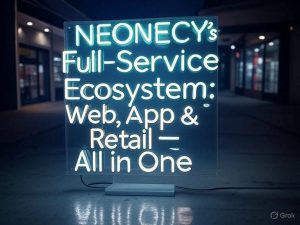In recent years, Web3 in Bangladesh has emerged as a topic of growing interest among tech entrepreneurs, startups, and forward-thinking businesses. With the rise of blockchain technology, decentralized applications (dApps), and cryptocurrencies, Bangladesh is positioned to embrace a digital revolution. But how prepared are local businesses for this transformation? This article explores the future of Web3 in Bangladesh and what every business should know to stay ahead.
Understanding Web3: A Brief Overview
Web3 represents the third era of the internet. It moves away from the centralized structures of Web2 (like Facebook and Google) to decentralized protocols powered by blockchain. In Web3, users have more control over their data, identities, and digital assets.
Key technologies powering Web3 include:
-
Blockchain
-
Smart Contracts
-
Decentralized Applications (dApps)
-
Cryptocurrencies and Tokens
-
NFTs (Non-Fungible Tokens)
-
Decentralized Finance (DeFi)
Web3 in Bangladesh offers the potential for greater transparency, lower transaction fees, and enhanced security for digital transactions and data management.
Current Status of Web3 in Bangladesh
Although Web3 adoption is still in its infancy in Bangladesh, the digital landscape is evolving rapidly:
-
Government interest in blockchain for transparency and e-governance.
-
Growing number of local Web3 startups and tech communities.
-
Increasing use of cryptocurrencies despite regulatory hurdles.
-
Educational institutions beginning to explore blockchain technology.
While Web3 in Bangladesh still faces regulatory and infrastructural challenges, the interest among developers and entrepreneurs is steadily rising.
Why Web3 Matters for Businesses in Bangladesh
The shift to Web3 offers a wide range of benefits for businesses operating in Bangladesh:
1. Decentralized Finance (DeFi) Opportunities
Businesses can bypass traditional banking systems and access global finance through DeFi platforms.
2. Smart Contracts for Automation
Smart contracts reduce reliance on third parties and automate business processes like payments, deliveries, and record-keeping.
3. Ownership & Tokenization
Assets can be tokenized—land records, artwork, music, and even business equity. This opens up new avenues for funding and asset management.
4. NFTs as Marketing and Product Tools
Brands can leverage NFTs for loyalty programs, limited-edition product drops, and unique digital experiences.
5. Global Reach
Web3 opens doors for cross-border trade and service delivery, ideal for freelancers, agencies, and e-commerce businesses in Bangladesh.
The future of Web3 in Bangladesh lies in its ability to democratize technology and make business processes more inclusive and accessible.
Industries Likely to Benefit Most
1. Freelancing & IT Services
Bangladesh’s booming freelance economy stands to benefit greatly from smart contracts and crypto-based payments.
2. Finance & Microfinance
Web3 allows transparent peer-to-peer lending and microfinance without centralized gatekeepers.
3. E-commerce
Integrating NFTs and decentralized platforms will create new ways to engage customers and build brand loyalty.
4. Creative Industries
Musicians, artists, and designers can tokenize their work and sell it directly, bypassing middlemen.
5. Education
Web3 can help verify certifications on the blockchain, ensuring authenticity and combating fraud.
Web3 in Bangladesh will revolutionize these sectors by reducing costs, increasing security, and providing new business models.
Challenges to Web3 Adoption in Bangladesh
Despite its promise, Web3 adoption is not without hurdles:
1. Regulatory Uncertainty
Cryptocurrency is not yet legal in Bangladesh, limiting full participation in Web3.
2. Lack of Awareness
Most businesses are still unaware of what Web3 is and how it can benefit them.
3. Infrastructure Gaps
Internet access and digital literacy still need improvement in many rural areas.
4. Cybersecurity Risks
Web3 systems are still vulnerable to hacks, scams, and smart contract bugs.
To unlock the full potential of Web3 in Bangladesh, both private and public sectors must work together to build knowledge, legal frameworks, and technical capacity.
Government and Institutional Involvement
To ensure the safe and beneficial integration of Web3 in Bangladesh, government and academic institutions need to:
-
Promote Web3 education and training programs.
-
Develop regulatory sandboxes to test blockchain applications.
-
Encourage public-private partnerships for innovation in governance and public services.
Collaboration between policymakers and developers will be crucial for shaping a responsible Web3 ecosystem.
What Businesses Should Do Now
1. Educate Your Team
Start with foundational knowledge of blockchain, NFTs, DeFi, and DAOs.
2. Experiment with Web3 Tools
Try using Web3 wallets like MetaMask, joining DAOs, or launching NFTs for branding.
3. Consult Experts
Partner with local Web3 agencies or freelance developers for pilot projects.
4. Watch the Regulatory Landscape
Stay updated with guidelines from the Bangladesh Bank and ICT Division.
Early adopters of Web3 in Bangladesh will have a significant competitive advantage when mainstream adoption begins.
The Role of Digital Agencies
Digital agencies in Bangladesh are uniquely positioned to:
-
Help businesses transition to Web3 platforms.
-
Offer smart contract development, NFT minting, and blockchain consultation.
-
Build dApps tailored to local business needs.
-
Educate and empower clients about Web3 in Bangladesh.
As trusted technology partners, these agencies can be the bridge between traditional businesses and the decentralized web.
Case Studies: Local Projects Leading the Way
Several early-stage startups and developer communities are making strides:
-
BanglaDAO – A local initiative promoting DAO education and experimentation.
-
Cryptic Technologies – A Dhaka-based firm developing NFT and smart contract solutions.
-
University-led blockchain labs – Encouraging research and prototype building.
These examples show that Web3 in Bangladesh is no longer theoretical—it’s already taking root.
Future Outlook
The future of Web3 in Bangladesh is filled with potential. Over the next decade, we can expect:
-
Legal frameworks for digital assets and DAOs.
-
Mass adoption of blockchain in e-governance and finance.
-
More startups offering Web3-based products and services.
-
Expansion of digital skill-building programs nationwide.
With the right investments in knowledge and infrastructure, Bangladesh can become a regional leader in Web3 innovation.
Conclusion
As the global economy moves towards decentralization, Web3 in Bangladesh is becoming more than just a buzzword—it’s a roadmap to innovation, inclusion, and global competitiveness. Businesses that act now by learning, experimenting, and integrating Web3 technologies will be the frontrunners in this new era.
Whether you’re running a startup, agency, or traditional enterprise, understanding the future of Web3 in Bangladesh is essential. Prepare your business today to be part of tomorrow’s decentralized world.





